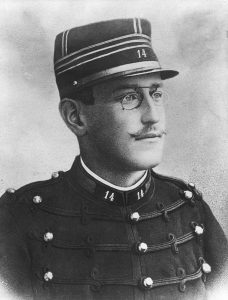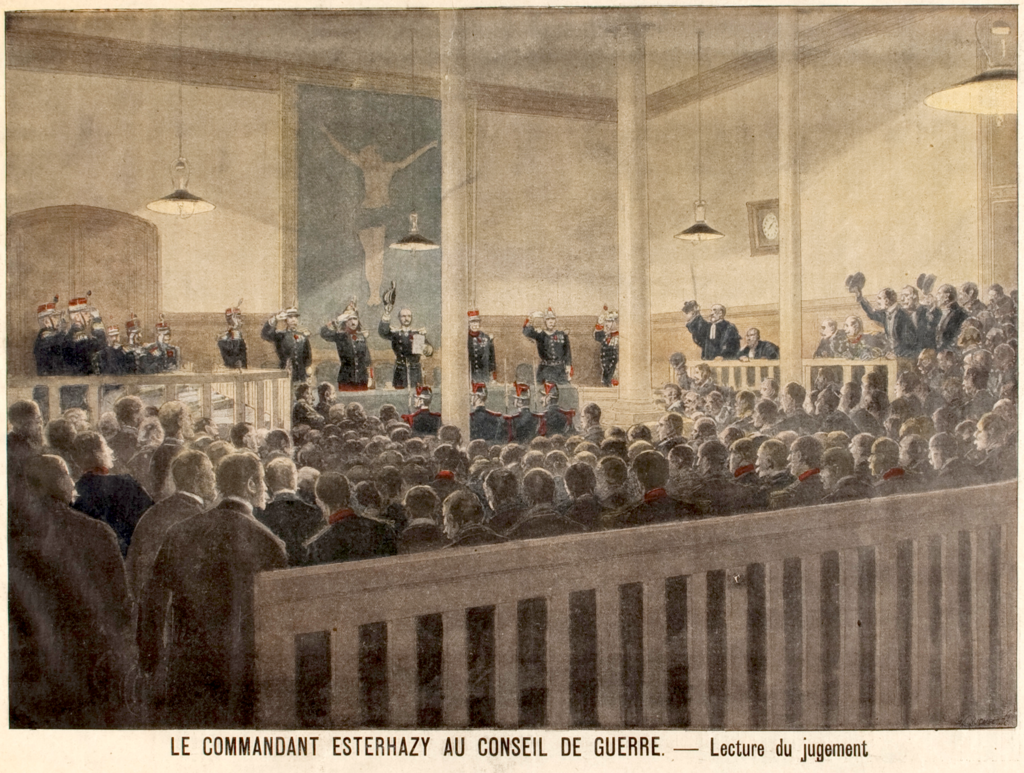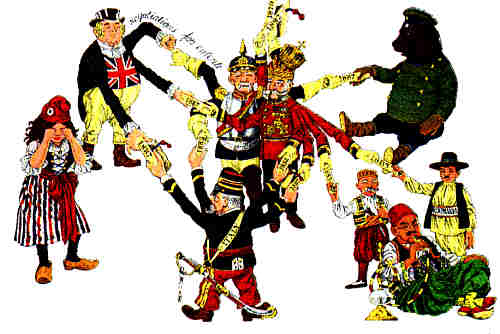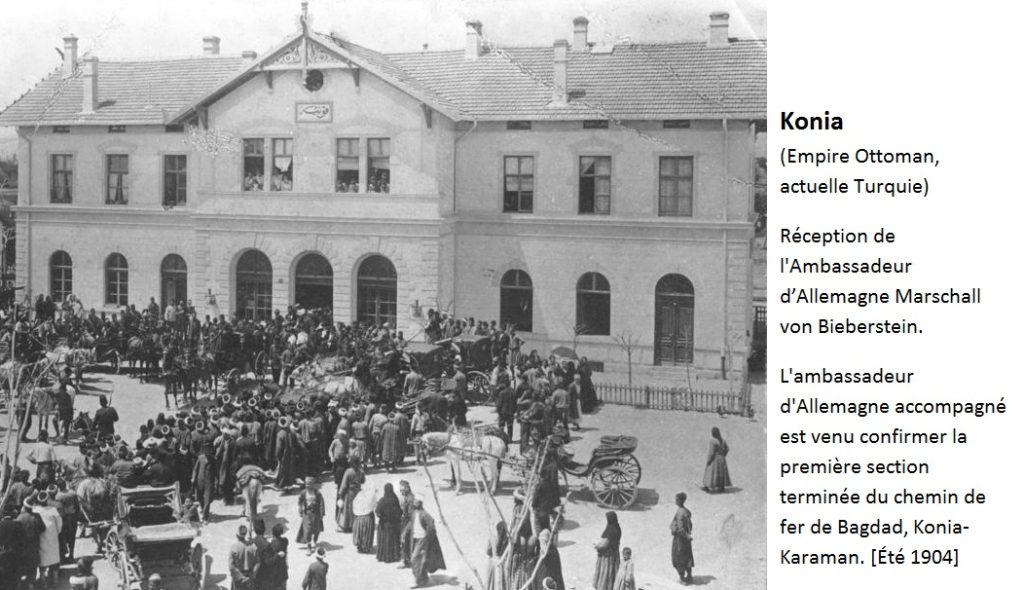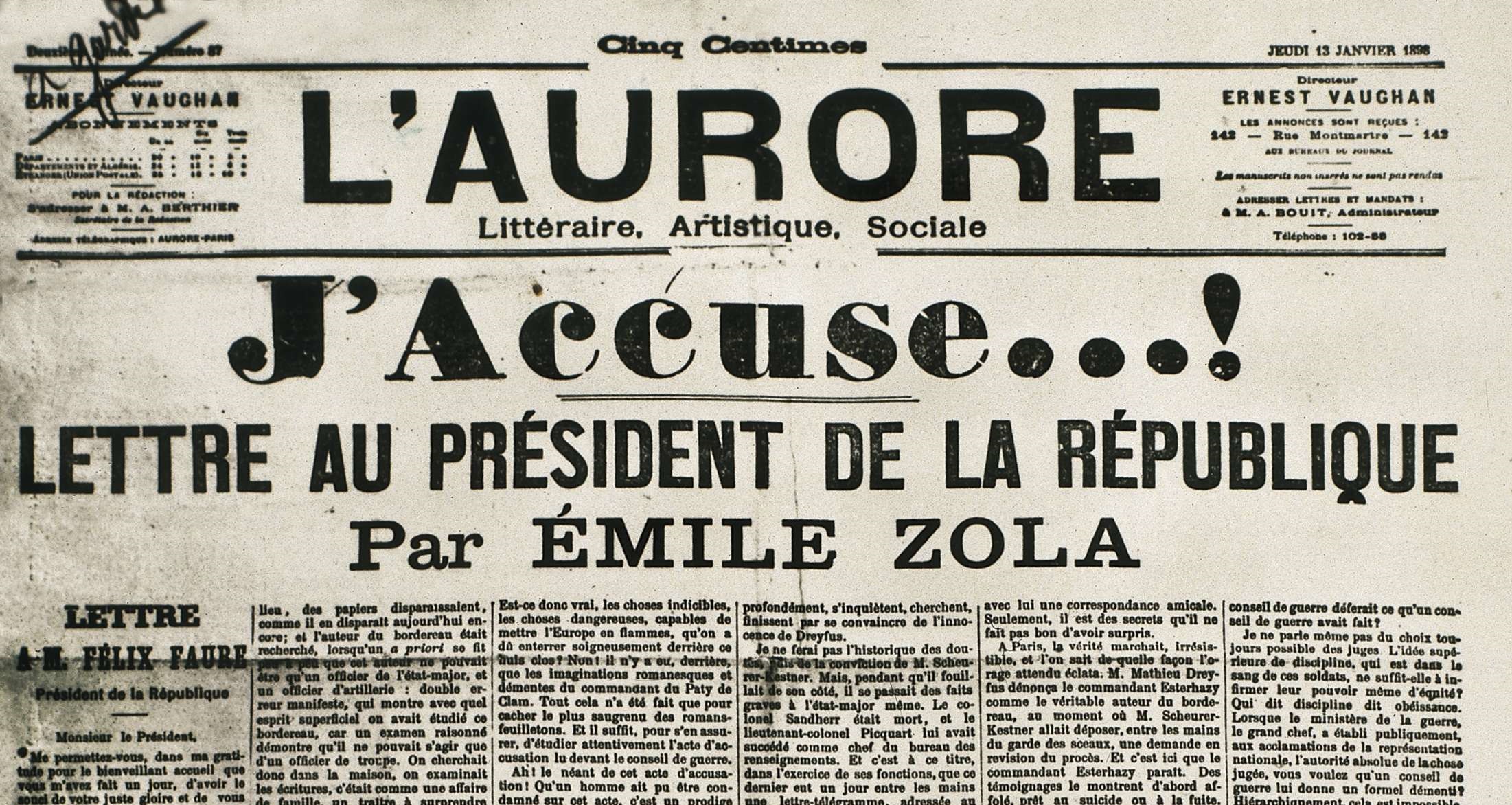
1890 AD to 1910 AD, Psalm 141: Dreyfus.
This site was first built in French (see www.147thgeneration.net). The English translation was mainly done using « google translation ». We have tried to correct the result of this translation to avoid interpretation errors. However, it is likely that there are unsatisfactory translations, do not hesitate to communicate them to us for correction.
(for that click on this paragraph)
Summary
This generation of the 1890s and 1900s.
According to our count, this generation is the 141th generation associated with Psalm 141. It is in this Psalm 141 that we therefore find an illustration of the facts of this generation.
This generation begins with « The Pogroms of Tsarist Russia », which is a sign of the grim future of Jews in Europe.
France is the country of human rights. Jews since have lived there with full citizenship. This generation marks « The end of the French exception » for Jews. It was in fact to this generation that the “Dreyfus affair” arose.
The war of 1870 had allowed the birth of the Second German Reich while guaranteeing a certain peace by the isolation of France. This generation demonstrates “the limits of the Bysmarkian system”, suggesting the conflicts of the 19th century.
Added to this are the threats to the Jews of the development of “Racial Theories and Anti-Semitism” in this generation.
All these negative orientations for European Judaism are partially counterbalanced by the birth of “Zionism” in this generation.
Talk
The pogroms of Czarist Russia
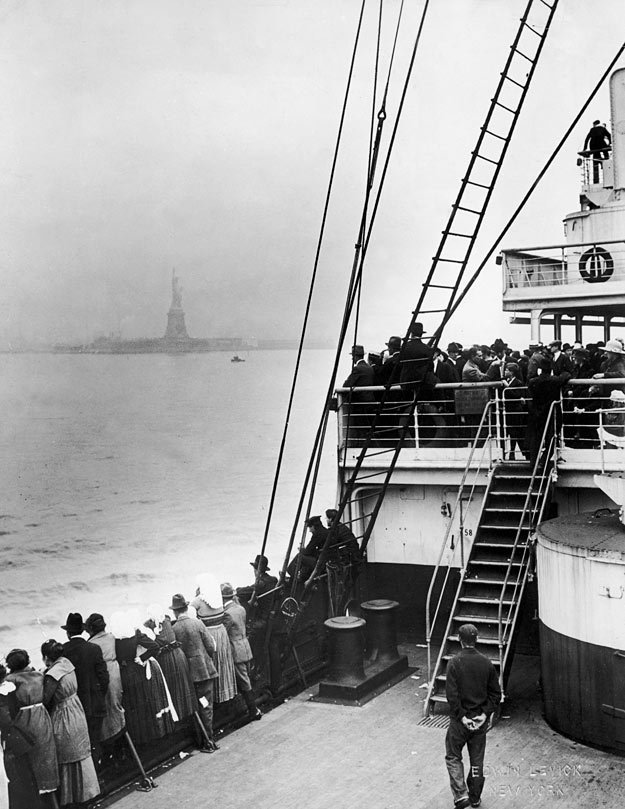
To this generation of the 1890s and 1900s, capitalism triumphs in the United States. The extraordinary success of a few, theoretically accessible to everyone, makes most people accept poverty or even extreme poverty. The American dream, however, continues to this generation has attracted the disinherited of Europe including many Jews fleeing anti-Semitism in Europe.
Capitalism triumphs in the United States, the extraordinary success of a few, theoretically accessible to everyone, makes most of them accept poverty, even extreme poverty. The American dream continues to this generation, however, has attracted the underprivileged of Europe, including many Jews fleeing antisemitism in Europe.
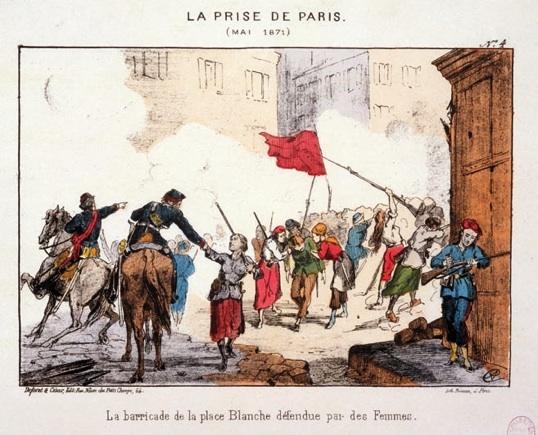
In reaction to triumphant capitalism, socialism has its followers especially in Europe. The 1st International, or international association of workers, did not survive the repression of the Paris Commune (in 1871) nor the differences between supporters of Marx and supporters of Bakunin. Dissolved in 1876, it was replaced by the International II founded in July 1889 at the Paris Congress.
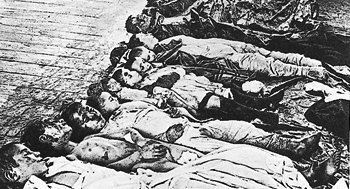
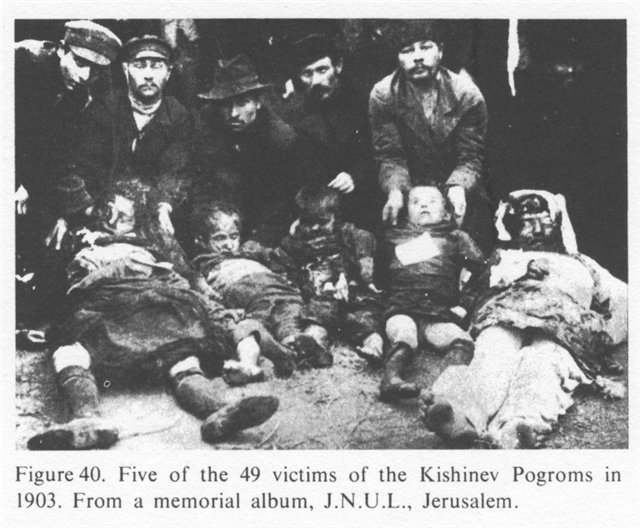
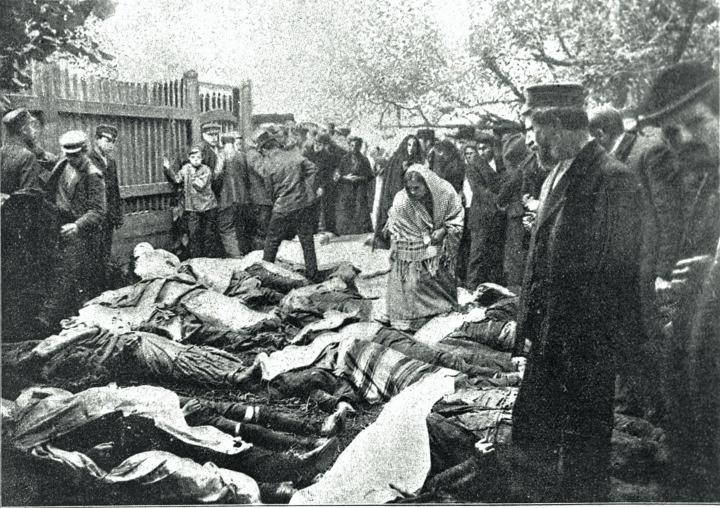
In Russia, the headlong rush of the Tsarist government’s imposed state antisemitism that culminated in the pogroms of this generation (1890-1910).
The worsening of the unrest in Russia and the rise of nationalism in Europe which will endanger the Jews of Europe, in this twentieth century, which begins at this generation, justify the prayer of David at the beginning of this psalm:

- A song of David. O Lord, I called You; hasten to me, give ear to my voice when I call out to You.
- My prayer shall be established like incense before You, the lifting of my hands as the evening offering.
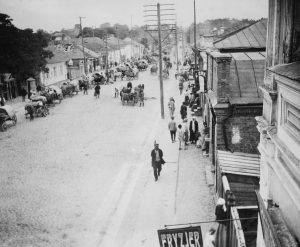
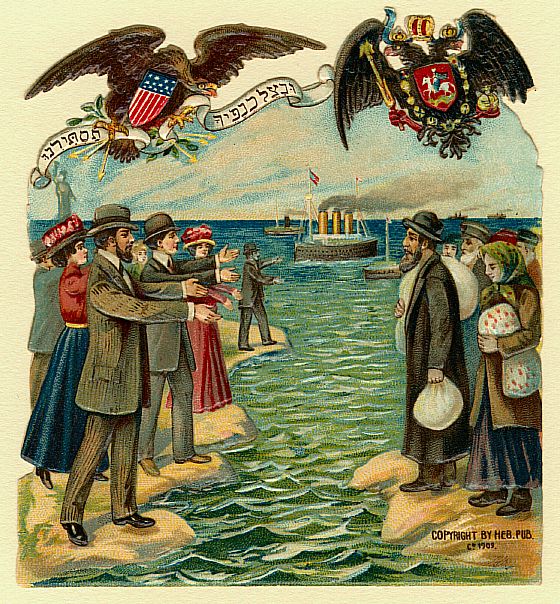
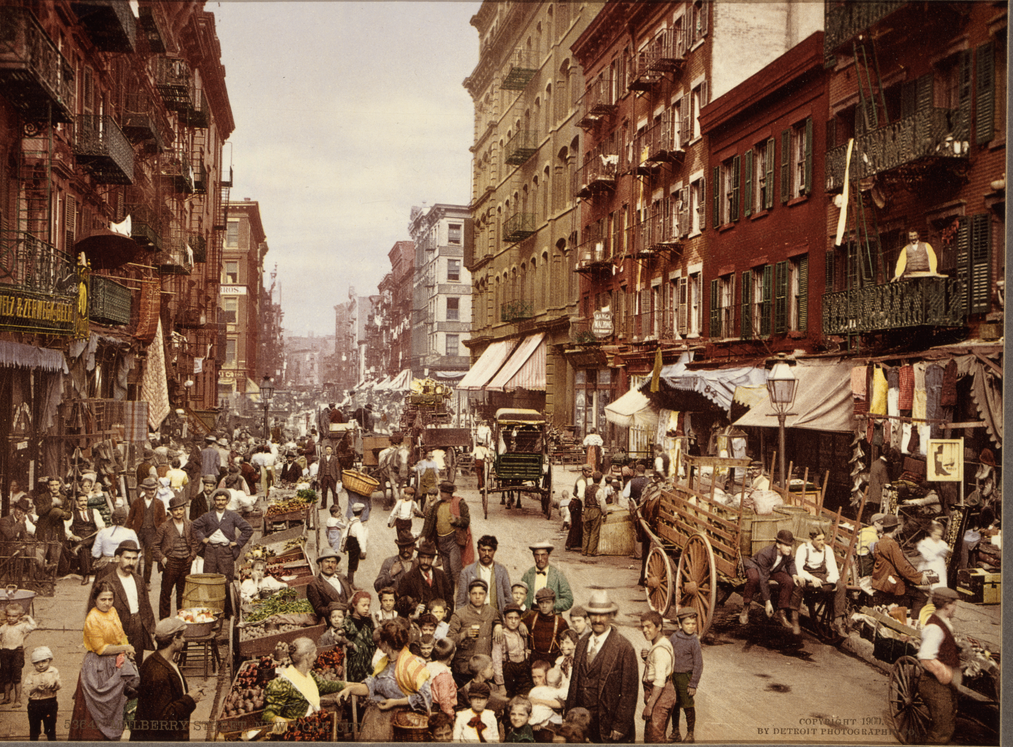
David’s prayer will be partly heard since there is a strong immigration to this generation keeping some of the Jews of Europe safe from twentieth-century disasters.
The pogroms in Russia and the rise of antisemitism related to the rise of nationalisms in Europe amplify the exodus of European Jews initiated to the previous generation (1870s and 1880s) causing the sadness of those who remain. The latter, however, for many will have their descendants decimated during the Holocaust while the exiles for those who decided to leave Europe will protect their descendants.
The Jewish population [1] of New York, estimated at 60,000 in 1870, increased to 1,100,000 in 1910. In 1906 (Russian pogrom), 153,748 Jews arrived in America, and more than one million between 1900 and 1910.
The end of the French exception
France, the country of human rights since the revolution of 1789, had until now been an exception in Europe in the policy towards the Jews. Unlike Germany, where conversion might seem like a necessary step towards citizenship, it is not necessary for integration in France. In spite of this, the French Jews who have every leisure to freely exercise their worship abandons it more and more as noted by a great rabbi of the time at the beginning of this generation. Yet less subject to anti-Semitism than in Germany, the French Jews had bet throughout the nineteenth century to a complete abandonment of their roots for better integration.
The return to Zion as the only way out for the Jewish people is evoked by an American Zionist in 1902 in response to a criticism of Zionism by an American rabbi:
- We [2] are (the Jews) today 10,500,000 souls, scattered throughout the entire universe […] There are actually fewer than 50,000 Jews worldwide who are not affected by anti-Semitism under a form or under another. […] This remedy can only be assimilation on one side and Zionism on the other.
- Let’s try to understand what assimilation means. This means that one day someone can write this epitaph: « In memory of a race whose greatest achievement was to put an end to its existence ». After all, we do not believe in this irony that two thousand years of maintaining our destiny can be absorbed in this worn-out formula: « Nothing in his life was more beautiful than his death. » I insist: if the assimilation has a meaning, it is that one, otherwise it does not mean anything.
- I now come to the Zionist ideology so often misunderstood […] It’s the Judaism of the future […] We are like a boomerang balloon thrown by the hands of history, and despite our tournaments we come back from where we left. The bitter tears we shed during the destruction of Jerusalem eighteen hundred and thirty-two years ago still burn the blood and marrow of the Jewish people.
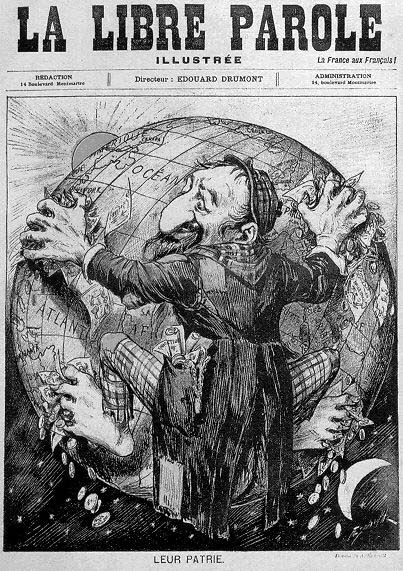
On the eve of the Dreyfus affair, France, a country of human rights, sees the emergence of a new antisemitism fueled in particular by Drumont. The latter surfing among others on the resentment of the Panama scandal, takes advantage of freedom of expression to distill a venom that will tilt France into hatred. This is likely to affect the arrival of twentieth-century disasters in Europe.
Although the injustice towards Dreyfus will be corrected in 1906, the weakened France will not be able to prevent the events from rushing tragically a few years later.
The conditions of the conflagration are thus established before the Dreyfus affair emerges:
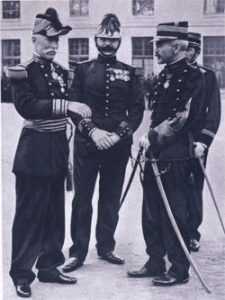
It may [3] seem odd today that the Dreyfus affair, which involves the honor of one man, has more repercussions in the world than all the trials for « ritual murder » in Germany or Austria-Hungary. the same time. […] The Dreyfus affair, almost ignored at first, quickly became the center of a real ideological war that tore apart not only the whole of France but also the rest of the world. For ten years the Jews of all countries, and with them the Democrats, have their eyes turned to France. The grace of Dreyfus, but especially its spectacular rehabilitation (July 12, 1906), accompanied by that of Zola, once again make France, as in 1791, a kind of second homeland for all the Jews of that time. […]
- General causes of antisemitism – xenophobia, professional jealousy, etc. – are also valid for France, and the influence of German antisemitism is evident. […]
- After 1870, France, deeply bruised by defeat, is animated by a chauvinistic and revenge spirit. Everything about the prestige of the army is untouchable. […]
L’affaire Dreyfus
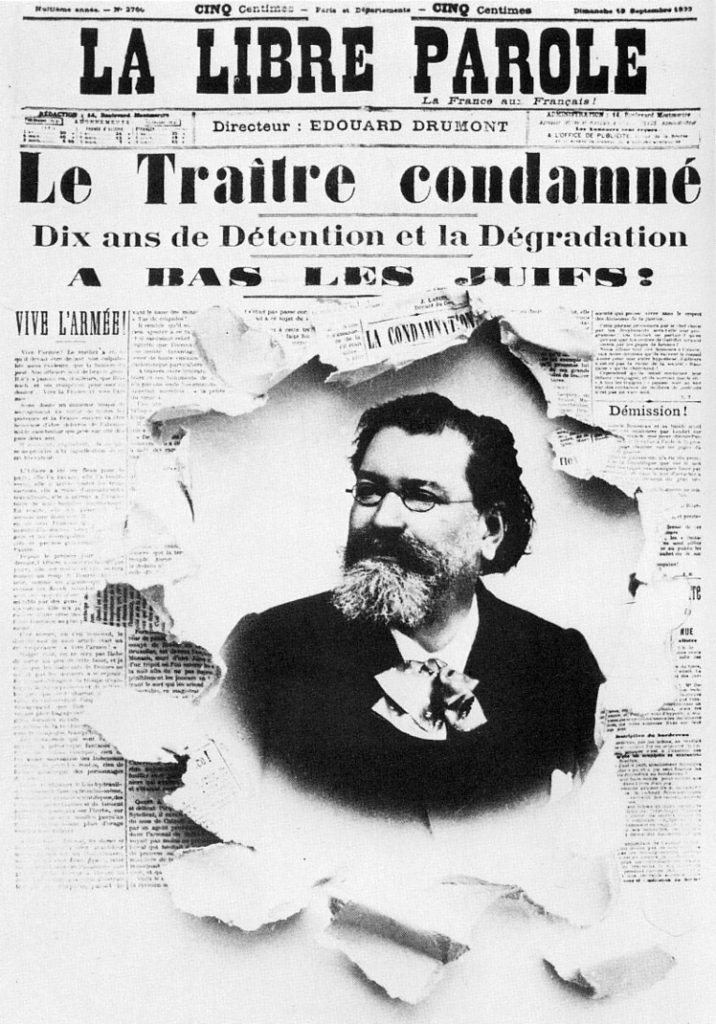
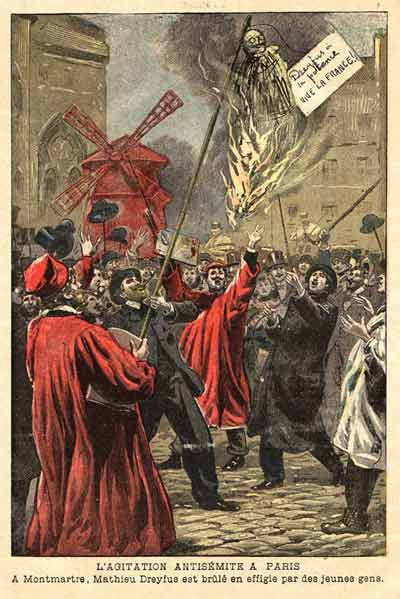
A [4] « slip » is found by French agents at the German Embassy in Paris. History will show that this slip is the work of Commander Ferdinand Esterhazy, whose great friend is Lieutenant-Colonel Henry.
The latter, in the wake of the campaign of Drumont, rightly believes that a Jew would be the ideal culprit to endorse the treason of his friend.
It is Alfred Dreyfus who will fall into the trap, the first Jewish officer to have been appointed to the General Staff of the Armed Forces. When the first experts struggled to prove Dreyfus’ guilt, he provoked a violent press campaign in Drumont’s « Libre Parole »
This is how the Dreyfus affair begins.
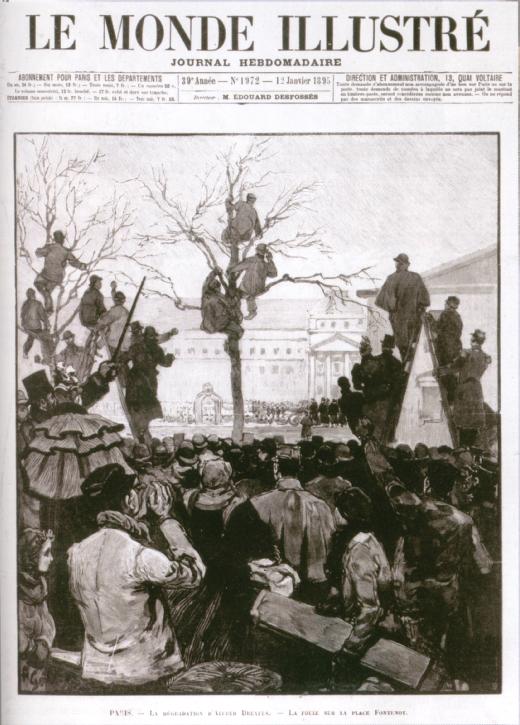
Violent anti-Semitic demonstrations are taking place throughout France, and many anti-Semitic movements and newspapers are being created.
The Dreyfus affair could be summarized as:
- Essentially [5], it was said in two words by Theodore Herzl, who, as a journalist,had witnessed the trial and the degradation: « They were not screaming « Death to Dreyfus! » But « Death to the Jews! » »
It is indeed the Dreyfus affair that the psalmist evokes in the following of the psalm of this generation:

- O Lord, place a guard for my mouth; watch the portal of my lips.
- Do not incline my heart to an evil thing, to perform deeds of wickedness with men who work iniquity, and may I not partake of their feasts.
- May a righteous man strike me with kindness and reprove me; may the oil of the anointment of my head not turn my head away, for as long as [I am] at my prayer, [it is] about their evils.
- Their judges were led astray by [their hearts of] stone, although they heard my words, which are pleasant.
This is why the psalmist is strict towards the judges (« were led astray by [their hearts of] stone ») because the responsibility of a magistrate is great when he knowingly condemns an innocent even if it is for an alleged maintenance of the established order.
Moreover the precautions of the judges will not allow France to avoid entering the war of 14 with the cost in human lives that we know. Or, they will have a responsibility in the advent of the events of the twentieth century by encouraging the old retrograde forces to drive the army and to prohibit the new vital forces represented by Dreyfus.
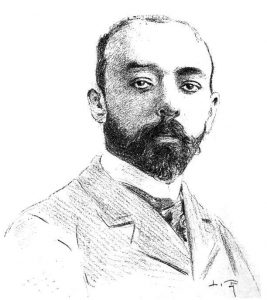
It was also the warning of Albert Clemenceau (lawyer and brother of Georges Clemenceau), unheard of, to the judges at the trial of Zola in 1898:
- Whatever [6] you decide, there can only be danger if you give up the cause of the law of justice you represent.
In Europe, after the War of 1870, this generation, from the 1890s and 1900s, seems to be a generation of peace. In fact, the world wars of the twentieth century are already being prepared.
The limits of the Bysmarkian system
The [7] military victories of 1866 and 1870-1871 and the creation of a unitary state made Germany one of the great powers. It has now taken the place hitherto occupied by France in Western Europe. In three decades, Germany manages to become the second largest economy in the world and the first in Europe.
Bismarck’s conceptions of foreign policy were those of a curator of his time, a defender of the established order and suspicious of revolutionary movements. They were also those of a European who was interested only in the problems of Europe and who was skeptical of colonial adventures. They were, finally, those of a pragmatist concerned with the maintenance of peace, a peace which, in his eyes, went through the isolation of France in order to avoid any risk of revenge coming from her. […]
On the whole, despite temporary and localized crises, the Bismarckian system allowed Europe to experience twenty years of peace. Upon his accession William II (1888-1918) ran up against Bismarck, his chancellor, who resigned in 1890. His resignation challenged the balance of alliances in Europe which resulted in the First World War.

One of the probable causes is the refusal by William II to renew the alliance with the Russians, which led them to establish an alliance with the French. A colonial policy was then established, driven inter alia by the Pan-German league itself, led by the management of Krupp companies. The new German post-Bismarckian policy would also push England to join forces with France, thus preparing the conditions sufficient for the outbreak of the First World War.
It is in Jerusalem that Germany seals her destiny:
- La weltpolitik [8] (world politics) of William II gradually aroused the fears of England, especially in 1898, when the emperor, passing through Jerusalem, then Ottoman possession, declared himself « the friend of the Sultan and the hundred million of Mohammedans scattered throughout the world « .
- This trip tightened the links between Germany and the Ottoman Empire. It was followed by lengthy negotiations which, in 1903, led to the conclusion of a concession agreement for the construction of a rail link between Constantinople and Baghdad. A railway of four thousand kilometers in length serving the Mosul oil zone, with the right to exploit the mineral wealth on twenty kilometers of depth on both sides of the route of the line. The Baghdad-Bahn affair, which added to the dynamism of German merchants throughout the British Empire, contributed greatly to the deterioration of relations between London and Berlin. […]
- The deterioration of the Anglo-German relations that followed the Baghdad-Bahn affair facilitated the reconciliation between France and the United Kingdom and allowed the realization of the entente cordiale by the agreement of April 8, 1904, which was added to the Franco-Italian reconciliation of 1896. France, an ally of Russia since 1892, was no longer isolated. A Europe divided into rival systems of alliance was being set up, with on one side the close-knit Central Empires, and what became the Entente with France and Russia, both reconciled with the Kingdom. -United.
Racial theories and antisemitism
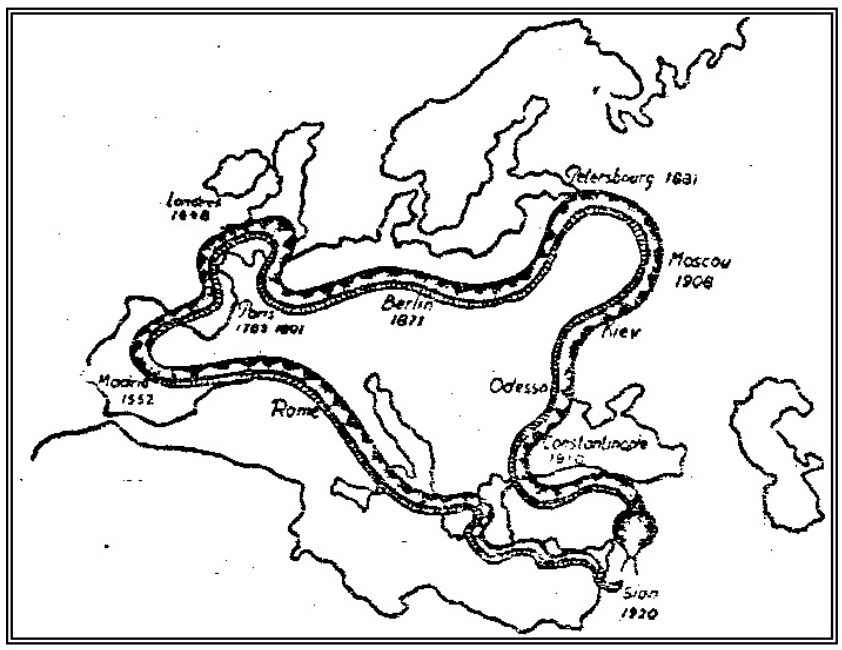
Anti-Semitism is released to this generation of the 1890s and 1900s:
- Appeared [9] in the years 1850-1870, modern anti-Semitism found its most effective propaganda tool in 1903. That year, a series of newspaper articles reported on the discovery of an astonishing report. At a secret meeting in Basel in 1897, the « Sages of Zion » decided to move on to the final phase of Jewish rule over the world and the destruction of the foundations of Christianity.
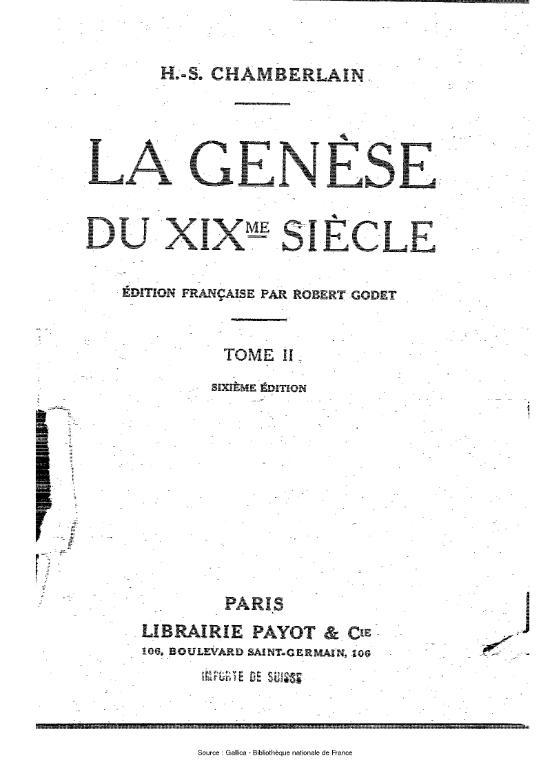
Also in racial theories:
- In 1898 [10], Houston Stewart Chamberlain already laid the pseudo-scientific foundations of racism in a voluminous book, soon translated into French under the title « La Genèse du XIXe siècle » (« The Genesis of the nineteenth century »). It exposes that two races share the history of the world since the origins of civilization: the « Aryans », who hold all the virtues, and the « Semites », who have all the vices. They try to fight against them. Their dissolving and perverse influence undermines the very foundations of European civilization.
The trap is closing around the Jews of Europe, in spite of the apparent peace, it is well the wars of the twentieth century which are announced to this generation: for the Jews, the Shoah during the Second World War. This war itself resulted from the First World War.
This is what the psalmist expresses in the following of the psalm of this generation:

- As one who chops and splits [wood] on the ground, our bones are scattered at the mouth of the grave.
- For to You, O God the Lord, are my eyes; I took shelter in You; do not cast out my soul.
Zionism
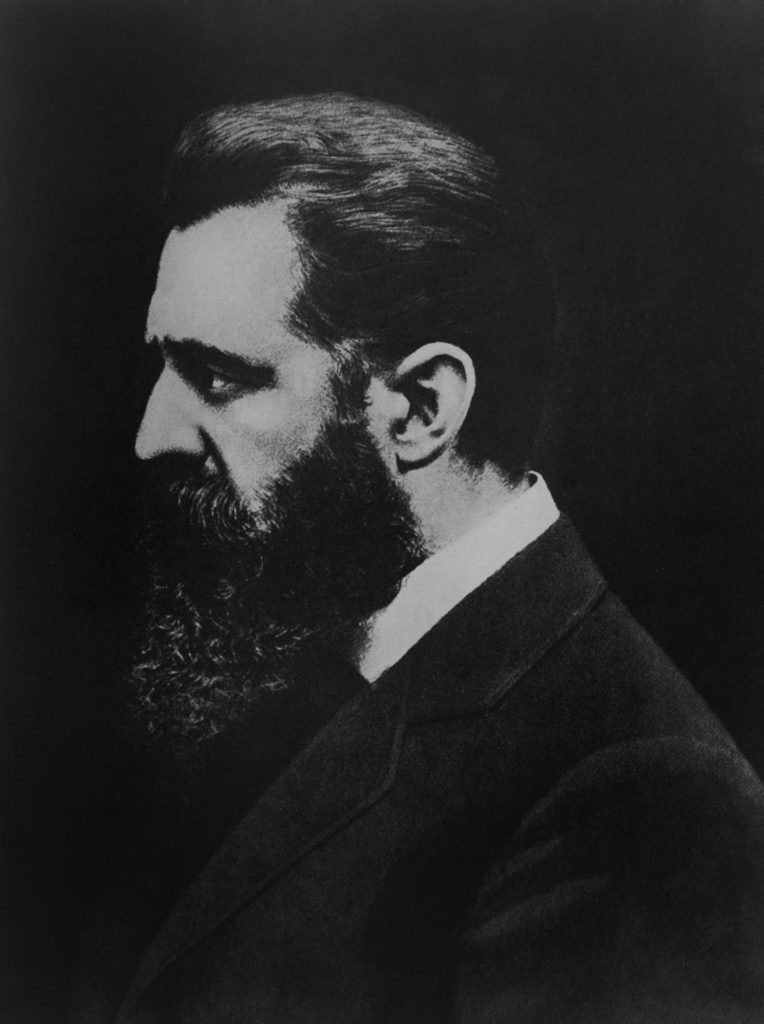
It is to this generation that Zionism is born which will not save the majority of the Jews of Europe but would save the Jewish people as a nation.
Herzl’s theories were not unanimous among Jewish communities, especially in Vienna, his home community.
The exactions in Russia have resulted in a new wave of immigration to Palestine:
So while the trap is being put in place for the Jews of Europe, the return to Zion is already largely initialized before Zionism. It grows with it and brings the seeds of the future survival of the Jewish people.
This is what the psalmist concludes in the psalm of this generation:

- Guard me from the snare that they have laid for me, and the traps of the workers of iniquity.
- May the wicked fall together, [each] into his nets, until I pass by.

[1] See: Riccardo Calimani: « The Jewish Wandering ». (French: « L’Errance juive ». (p. 493 et 495) )
[2] Renée Neher-Bernheim: « Jewish History of the Revolution to the State of Israel ». Quote from an article by Jacob de Haas published in 1902. (French: « Histoire juive de la Révolution à l’État d’Israël ». (p. 600 à 602) ).
[3] Renée Neher-Bernheim: « Jewish History of the Revolution to the State of Israel ». (French: « Histoire juive de la Révolution à l’État d’Israël ». (p. 457,459) )
[4] According to Renée Neher-Bernheim: « Jewish History of the Revolution to the State of Israel ». (French: « Histoire juive de la Révolution à l’État d’Israël ». (p. 459,460) )
[5] Leon Poliakov: « History of anti-Semitism: 2 – the age of science ». (French: « Histoire de l’antisémitisme : 2 – l’âge de la science ». (p. 299) )
[6] Renée Neher-Bernheim: « Jewish History of the Revolution to the State of Israel ». Extract from the Pleadings of Albert Clemenceau 1898. (French: « Histoire juive de la Révolution à l’État d’Israël ». (p. 473) ).
[7] From: Henry Bogdan: « History of Germany, from Germany to the present day ». (French: « Histoire de l’Allemagne, de la Germanie à nos jours ». (p. 325, 327 à 331) )
[8] Henry Bogdan: « History of Germany, from Germany to the present day ». (French: « Histoire de l’Allemagne, de la Germanie à nos jours ». (p. 331, 332) )
[9] (Led by) Theodore Zeldin: « The history of the world, from 1789 to 1918 ». Chapter: « The birth of Zionism ». (French: « L’histoire du monde, de 1789 à 1918 ». Chapitre : « La naissance du sionisme ». (p. 403) )
[10] Renée Neher-Bernheim: « Jewish History of the Revolution to the State of Israel ». (French: « Histoire juive de la Révolution à l’État d’Israël ». (p. 431,432) )

